新概unit23-24_课堂笔记,作业_补充练习
新概念第一册 Lesson 23-24

Listen and Answer the question: Which glasses does the man want?
Give后面双宾语,直接宾语some glasses, 间接 宾语me。 人称代词作宾语要用人称代词的宾格,如me, us, you, him, her, them, it.
• 下面句子中的on, in, under是表示方位的介词, 称为方位介词)
• It’s on the box. 它在箱子上面。 • *It’s in /ɪn/ the box. 它在箱子里面。 • *It’s under /ˈʌndə(r)/the box. 它在箱子下面。
Shelf
• shelf /ʃelf/ n.架子 • book shelf 书架
Complete the sentences using me, him, her, us or them.
• 1. Give Jane this watch. Give __h_e_r__ this one, too. • 2.Give the children these ice creams. Give __th_e__m_
plate /pleɪt/ n. 盘子
dress n. 连衣裙,v. 穿衣服
cupboard /ˈkʌbəd/ n. 食橱 magazine /ˌmæɡəˈziːn/ n. 杂志
cup 杯子+ board 木板
bed /bed/ n. 床
cigarette ˈnjuːzpeɪpə/ n. 报纸
Role-play • MAN: Give me some glasses please, Jane. • WOMAN: Which glasses? • WOMAN: These glasses?
新概念英语第一册自学笔记含课后练习答案:Lesson23-24

新概念英语第一册自学笔记含课后练习答案:Lesson23-24新概念英语第一册第23-24课课文详注 further notes on the text1.动词的双宾语在give me some glasses中,动词give后面有两个宾语,即直接宾语some glasses和间接宾语me。
人称代词作宾语时要用人称代词的宾格。
请参见lessons 21~22语法部分。
2.the ones on the shelf.是架子上的那几只。
本句是省略句,句首省略了i want。
句中的ones代表glasses。
on the shelf是介词短语,作定语,修饰ones。
3.these?这几只?是do you want these?的省略形式。
4.yes, please.是的,请拿给我。
当别人问你要不要某物而你同意要时,就可用这句话。
又如:假如你不同意要,则应说:no, thank you. 不,谢谢。
5.数字1,117,1,420,1,925,2,000的英文写法1,117----one thousand one hundred and seventeen1,420----one thousand four hundred and twenty1,925----one thousand nine hundred and twenty-five2,000----two thousand新概念英语第一册第23-24课语法 grammar in useon引导的介词短语(1)我们经常在名词、名词短语、代词或动名词前面用介词表示人物、事件等与其他人物、事件等之间的各种关系,如空间关系、时间关系、因果关系等。
介词始终带有宾语。
即使介词与宾语分开时,这种关系仍必定存有。
有很多固定的介词短语常可见到。
很多介词短语是由介词+名词(+介词)构成的,如:on time(准时),in the middle of(在……中间)。
新概念第一册 lesson 23-24 知识点全析
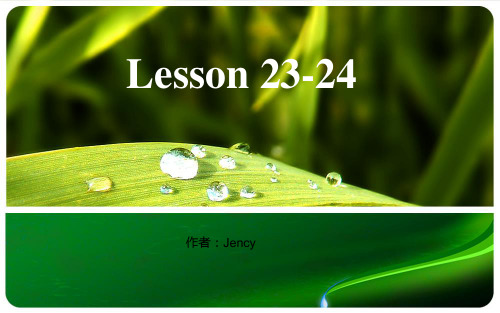
10.dressing table n. 梳妆台
hairdresser 理发师
11.magazine n. 杂志
12.bed n. 床
bedroom 卧室 dr--/dr/
13.newspaper n. 报纸
但newspaper
是可数名词
news “新闻” 不可数n
paper “纸”,不可数n
14.stereo n. 立词 vt + 宾语(动作承担者)
不及物动词 vi
Vt 例句:I love you. He eats ice cream. They have three
umbrellas.
Vi 例句:Come here. The policeman runs very fast. I walk slowly.
不及物动词如何才能跟宾语?
请大家看着我。 Please look me,everyone!
在记忆单词时 ,注意词性, 若是vi,最好到 课文或词典中 寻找其相应的 介词搭配
Please look at me,everyone!
警察为人民服务(服务:serve) Policemen serve for people.
on a cool morning 在一个寒冷的早上
注意:在早上“in the morning”
on the morning of August 8th 在8月8号上午
(4).用在星期、节日前。
on Monday 在星期一; on Teachers' Day 在教师节
2.shelf n. 架子,搁板 复数: shelves
Lesson 23-24
作者:Jency
一.课文预览 二.单词讲解 三.句型讲解 四.语法讲解
新概念第二册课文翻译及学习笔记【Lesson22、23、24】
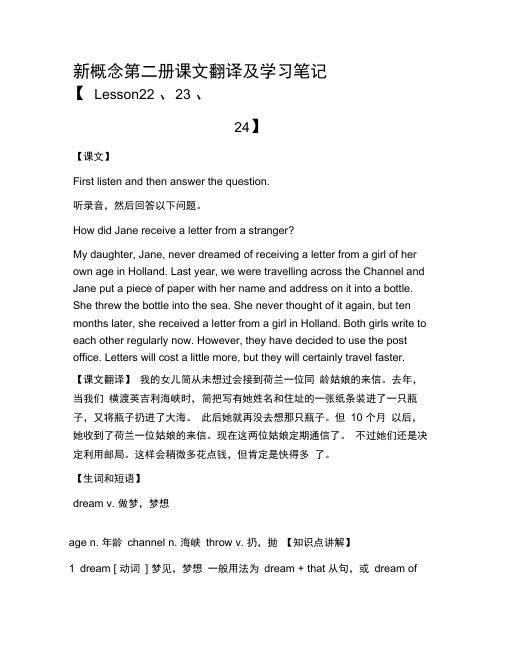
新概念第二册课文翻译及学习笔记【Lesson22 、23 、24】【课文】First listen and then answer the question.听录音,然后回答以下问题。
How did Jane receive a letter from a stranger?My daughter, Jane, never dreamed of receiving a letter from a girl of her own age in Holland. Last year, we were travelling across the Channel and Jane put a piece of paper with her name and address on it into a bottle. She threw the bottle into the sea. She never thought of it again, but ten months later, she received a letter from a girl in Holland. Both girls write to each other regularly now. However, they have decided to use the post office. Letters will cost a little more, but they will certainly travel faster. 【课文翻译】我的女儿简从未想过会接到荷兰一位同龄姑娘的来信。
去年,当我们横渡英吉利海峡时,简把写有她姓名和住址的一张纸条装进了一只瓶子,又将瓶子扔进了大海。
此后她就再没去想那只瓶子。
但10 个月以后,她收到了荷兰一位姑娘的来信。
现在这两位姑娘定期通信了。
不过她们还是决定利用邮局。
这样会稍微多花点钱,但肯定是快得多了。
新概念一(成人版)Lesson 23~24笔记空白测试和答案
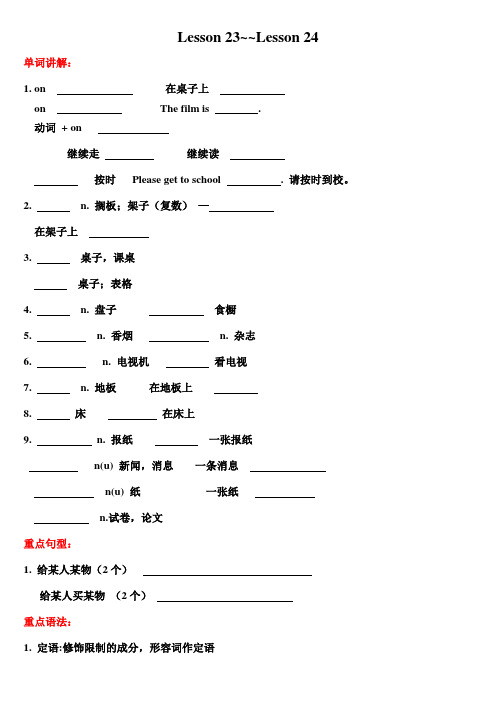
Lesson 23~~Lesson 24单词讲解:1. on 在桌子上on The film is .动词+ on继续走继续读按时Please get to school . 请按时到校。
2. n. 搁板;架子(复数)—在架子上3. 桌子,课桌桌子;表格4. n. 盘子食橱5. n. 香烟n. 杂志6. n. 电视机看电视7. n. 地板在地板上8. 床在床上9. n. 报纸一张报纸n(u) 新闻,消息一条消息n(u) 纸一张纸n.试卷,论文重点句型:1. 给某人某物(2个)给某人买某物(2个)重点语法:1. 定语:修饰限制的成分,形容词作定语a cup 一个干净的杯子the boy 树下的那个男孩介词短语2. 宾格位于之后作宾语。
课文讲解:1. Give me some glasses please. =Give some glasses to me, please. some “一些”,修饰。
any “一些”,修饰。
some 用在句;any用在句中。
2. The ones 架子上的玻璃杯介词短语(后置定语)3. 给你。
4. 单数和复数this —that —it—am/is —名词或代词6.14.20171. 他们是做什么工作的?What are their jobs? =What do they do? =What are you?2. 对的Right. =You are right. =That’s right.3. There be 句型的一般将来时:There will be+…There is/are going to be…4. There are many books on the desk. (对划线部分提问)What is on the desk?对主语提问: 物用What’s …? 人用Who’s…?There is a map on the wall. (对划线部分提问)—How many maps are there on the wall?5. 给某人某物(2个):give sb. sth. =give sth. to sb.给某人买某物(2个)buy sb. sth. =buy sth. for sb.6. The boy is under the tree. (对划线部分提问)Where is the boy?The boy under the tree is my brother. (对划线部分提问)Which boy is your brother?The woman in red is my teacher. (对划线部分提问)Which woman is your teacher?He does his homework every evening. (对划线部分提问)What does he do every evening?This is my book. (对划线部分提问)Whose book is this?对形物代提问Whose + 名词…?3. —The book is . —I like the colour very much.A. TomB. bluesC. redD. Tim’s9. —Which book is Li Lei’s? —The on the shelf.A. itB. oneC. otherD. anotherit 它,代替单数可数名词,表示特指,“同类同物”I have a bike. It is black.one 代替单数可数名词,表示泛指,“同类异物”—I don’t like this shirt. Please show me another one.3. This is his umbrella. (对划线部分提问)Whose umbrella is this?Lesson 23~~Lesson 24 单词讲解:1. on 在……之上在桌子上on the deskon 上映,上演The film is on.动词+ on “继续…”继续走go on 继续读read onon time 按时Please get to school on time.2. shelf n. 搁板;架子(复数)—shelves在架子上on the shelf3. desk 桌子,课桌table 桌子;表格4. plate n. 盘子cupboard 食橱5. cigarette n. 香烟magazine n. 杂志6. television n. 电视机watch TV 看电视7. floor n. 地板在地板上on the floor8. bed 床on the bed 在床上9. newspaper n. 报纸 a newspaper 一张报纸news n(u) 新闻,消息一条消息 a piece of news paper n(u) 纸一张纸 a piece of paperpapers n.试卷,论文重点句型:1. 给某人某物give sb. sth. =give sth. to sb.给某人买某物buy sb. sth. =buy sth. for sb.重点语法:1. 定语:修饰限制的成分,形容词作定语a clean cup 一个干净的杯子the boy under the tree树下的那个男孩介词短语2. 宾格位于动词或介词之后作宾语。
新概念23-24笔记

新概念第一册23-24 课文详解
课文详注
1.Give me some glasses.=Give some glasses to me.
类似的可以跟双宾结构的词语
bring sb. sth.=bring sth. to sb.【带来】
pass sb. sth.=pass sth. to sb.【递】
take sb. sth.=take sth. to sb.【拿给】
tell sb. sth.=tell sth. to sb.【告诉】
teach sb. sth.=teach sth. to sb. 【教】
2.The ones on the shelf.是架子上的那几只。
on the shelf是介词短语,作定语,修饰ones。
对on the shelf这种后置定语提问,特殊疑问词用which。
如:The cat on the desk is white.(对划线部分提问)
Which cat is white?
语法
some/any
相同点:some和any都是“一些”的意思,都可以修饰可数名词复数和不可数名词,如:
some/any dogs几只狗
some/any milk 一些牛奶
不同点:some一般用在肯定句中,any一般用于否定句或疑问句中。
口诀:some用于肯定句,any用于否或疑。
在变否定句或变一般疑问句时,除了要注意大小写、标点、人称之外,还要注意some-any,如:
There are some goats.(肯定句)
There aren’t any goats.(否定句)
Are there any goats?(一般疑问句)。
(完整word版)新概念2 第23课-24课-25课 练习、家庭作业、小测试、听写
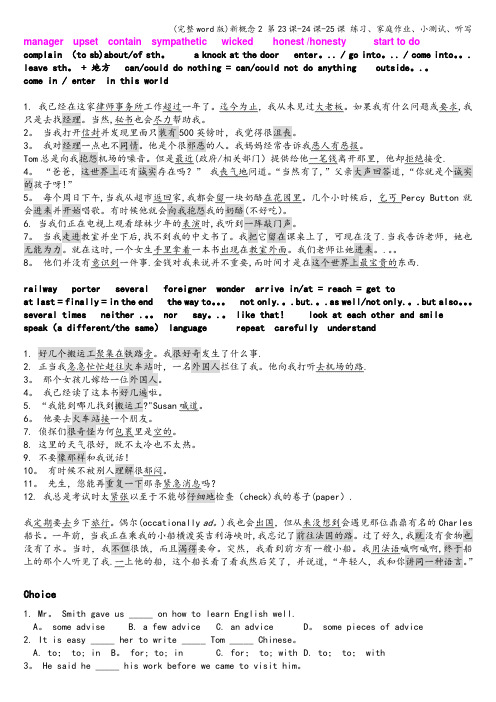
manager upset contain sympathetic wicked honest /honesty start to docomplain (to sb)about/of sth。
a knock at the door enter。
.. / go into。
.. / come into。
. leave sth。
+ 地方 can/could do nothing = can/could not do anything outside。
.。
come in / enter in this world1. 我已经在这家律师事务所工作超过一年了。
迄今为止,我从未见过大老板。
如果我有什么问题或要求,我只是去找经理。
当然,秘书也会尽力帮助我。
2。
当我打开信封并发现里面只装有500英镑时,我觉得很沮丧。
3。
我对经理一点也不同情。
他是个很邪恶的人。
我妈妈经常告诉我恶人有恶报。
Tom总是向我抱怨机场的噪音。
但是最近(政府/相关部门)提供给他一笔钱离开那里,他却拒绝接受.4。
“爸爸,这世界上还有诚实存在吗?”我丧气地问道。
“当然有了,”父亲大声回答道,“你就是个诚实的孩子呀5。
每个周日下午,当我从超市返回家,我都会留一块奶酪在花园里。
几个小时候后,乞丐Percy Button就会进来并开始唱歌。
有时候他就会向我抱怨我的奶酪(不好吃)。
6. 当我们正在电视上观看绿林少年的表演时,我听到一阵敲门声。
7。
当我走进教室并坐下后,找不到我的中文书了。
我把它留在课桌上了,可现在没了.当我告诉老师,她也无能为力。
就在这时,一个女生手里拿着一本书出现在教室外面。
我们老师让她进来。
.。
8。
他们并没有意识到一件事.金钱对我来说并不重要,而时间才是在这个世界上最宝贵的东西.railway porter several foreigner wonder arrive in/at = reach = get toat last = finally = in the end the way to。
《新概念英语》第二册学习笔记24 23课
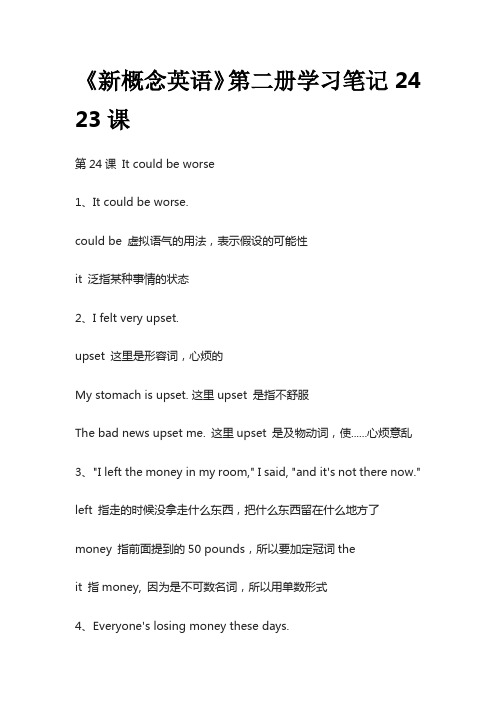
《新概念英语》第二册学习笔记24 23课第24课It could be worse1、It could be worse.could be 虚拟语气的用法,表示假设的可能性it 泛指某种事情的状态2、I felt very upset.upset 这里是形容词,心烦的My stomach is upset. 这里upset 是指不舒服The bad news upset me. 这里upset 是及物动词,使......心烦意乱3、"I left the money in my room," I said, "and it's not there now."left 指走的时候没拿走什么东西,把什么东西留在什么地方了money 指前面提到的50 pounds,所以要加定冠词theit 指money, 因为是不可数名词,所以用单数形式4、Everyone's losing money these days.is losing 此句用的是现在进行时,表示的是不断重复的动作,通常有埋怨的意思these days 最近,近来one of these days 最近的某一天money 此句中是一个泛指的概念,所以不用定冠词5、He started to complain about this wicked world but was interrupted by a knock at thedoor.complain about 对什么事情抱怨,发牢骚6、There is still some honesty in this world.some 这里是少许的意思honesty 是抽象名词,用单数形式,所以前面是is7、直接引语是直接引用原话,注意一句话没说完,中间用逗号,下一句开始单词首字母不用大写。
第23课A new house1、I had a letter from my sister yesterday.had 这里的意思是received2、If she comes, she will get a surprise.此句是由if 引导的条件状语从句,注意:条件状语从句要用一般现在时,尽管表示的是将来要发生的事情,主句要用一般将来时。
新概念1lesson23--24
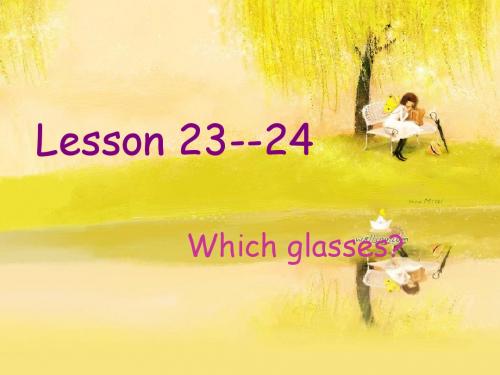
I was born _____
onJune 1,1992.
in
I was born on ___ Children’s Day.
I was born _____ June,1992. 好郁闷啊! 分不清 了耶!!! I was born _____ 1992.
in
热身练习
1. Mary is flying to France soon. She will arrive _______Paris ______the morning of July 9. A. at, in B. in, on C. in, in D. at, on 2. Guangzhou is _________ the south of China. Japan is _________ the east of China. A. to…in B. in…in C. to…in D. in…to
• • • • • • • • • •
soup spoon glass fruit plate paper towel tea-pot dish rice bowl knife mug toothpick
• • • • • • • • • •
汤勺 玻璃杯 水果盘 纸巾 茶壶 碟子 饭碗 餐刀 马克杯 牙签
什么是介词?它的作用是什么?
• • • • 1.Look at me.( 代词 ) 2.He goes to school by bike.( 名词 ) 3.He is interested in drawing.( 动名词 ) 4.The book is on the desk.( 名词 )
代词 名词 、_______ 动名词 介词:通常用在_________ 、_______
新概念第二册课文翻译及学习笔记【Lesson22、23、24】
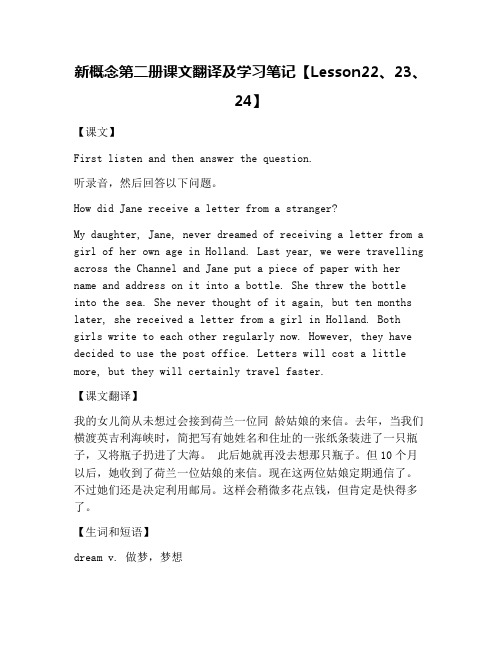
新概念第二册课文翻译及学习笔记【Lesson22、23、24】【课文】First listen and then answer the question.听录音,然后回答以下问题。
How did Jane receive a letter from a stranger?My daughter, Jane, never dreamed of receiving a letter from a girl of her own age in Holland. Last year, we were travelling across the Channel and Jane put a piece of paper with her name and address on it into a bottle. She threw the bottle into the sea. She never thought of it again, but ten months later, she received a letter from a girl in Holland. Both girls write to each other regularly now. However, they have decided to use the post office. Letters will cost a little more, but they will certainly travel faster.【课文翻译】我的女儿简从未想过会接到荷兰一位同龄姑娘的来信。
去年,当我们横渡英吉利海峡时,简把写有她姓名和住址的一张纸条装进了一只瓶子,又将瓶子扔进了大海。
此后她就再没去想那只瓶子。
但10个月以后,她收到了荷兰一位姑娘的来信。
现在这两位姑娘定期通信了。
不过她们还是决定利用邮局。
这样会稍微多花点钱,但肯定是快得多了。
新概念一 Lesson 23-24 25-26 课堂笔记+课堂总结

词汇详解:
Lesson23-24 课堂笔记
1. On 拓展:
在墙上: on the wall
在墙里面: in the wall
把它放在桌上。Put it on the desk/table
补充: 1 在...之上 2 在....时候
e.g. 在 5 月 12 号/5 月 19 日 On May 19th Mother’s Day
一课一练 P19 IV.翻译: 那儿有一辆红色的小汽车吗? Is that a red small car? Is there a red car over there?
P20 IV.翻译: 2.我的祖母很胖。My grandmother are/ isvery fat.单复数 4.那些鞋子很大。 These shoes are very big. Those
基数词
one 一 two three four Grade one 一年级
序数词
first 第一 second third forth
奶爸钱:13917961944
第 6 页 共 15 页
10. Dressing table dressing room: 梳妆间
11. Magazine Weekly/monthly magazine 周刊/月刊 年刊 Yearly magazine 补充: Fashion magazine: 时尚杂志
Ⅲ.连词成句: 4.Are those Steven’s black shoes?(×) Those black shoes are Steven’s.(√)
IV.翻译: 1. 哪件衬衫是你的?Which shirt is your? (×)
奶爸钱:13917961944
新概念23-24

英语中的 花朵 jasmine 茉莉 lilac 丁香 lily 百合 magnolia [mæ g’nəʊljə]木兰花 、玉兰花 morning glory 牵牛(喇叭花) narcissus [nɑ:’sɪsəs]水仙花 orchid [‘ɔ:kɪd]兰花 peony 牡丹
azalea 杜鹃花 begonia 秋海棠 Brazil 巴西木 cactus 仙人掌 camellia 山茶花 carnation 康乃 馨 Chinese enkianthus 灯笼花 Chinese flowering crab-apple 海棠花 chrysanthemum 菊花 dahlia 大丽花 daisy 雏菊 datura 曼陀罗 epiphyllum 昙花 fringed iris 蝴蝶花 fuchsia 倒挂金钟 gardenia India canna 美人 蕉
这些靠垫是柔和的蓝色,与地板上的中国小 地毯很相配。
2.(表示粘贴或附着)在…上 I admired the peeling paint on the ceiling. 我“观赏”着天花板上正在剥落的油漆. The clock on the wall showed one minute to twelve. 墙上的钟指向11点59分。
Lesson 23 Which glasses?
哪几只杯子?
New words and expressions
on prep. 1.(表示支承)在…上 He is sitting beside her on the sofa... 他挨着她坐在沙发上。 The cushions were soft blue to match the Chinese rug on the floor.
Lesson 24 New words and expressions dressing table n. 梳妆台 magazine n.杂志 stereo n. 立体声音响
新概念英语笔记-第一册(Lesson23-Lesson24)

新概念英语笔记(第一册)Lesson 23-24Content and Aim内容和目标One的复数的使用(ones)双宾语结构(本课重点)Key Words and Expressions关键词和词组on在…之上shelf架子,隔板on the shelf在架子上Language Points语言点Give me some glasses please, Jane.这是祈使句,前一课学习过,这里换成了复数的说法。
Glasses在这里表示“玻璃杯”。
本课我们将学习这个动词“give”的用法。
1.句中的动词give后面有两个宾语,一个是“me(人)”,一个是“some glasses(物)”,我们称之为双宾语,人是间接宾语,物是直接宾语。
这样的动词我们称之为授与动词,特色就是接两个宾语。
2.这里“me”是间接宾语,“some glasses”是直接宾语,这句话的结构是:动词+间接宾语(人)+直接宾语(物)一般来讲都是间接宾语(人)在前,直接宾语(物)在后。
请记住以下常用的双宾语动词:give给某人…lend借给某人…send送给某人…hand递给某人…pass递给某人….buy…给某人买…make…给某人做…sing…给某人唱…例如:Give me some pens, please.Can you lend me a book?My mother buys me a very beautiful gift.Please sing us a song.3.双宾语结构的间接宾语和直接宾语一般情况下可以互换,需要注意的是,如果把直接宾语(物)放在前,那么间接宾语前面需要加上适当的介词。
其结构是:动词+直接宾语(物)+介词(to/for)+间接宾语(人)互换以后是直接宾语(物)在前,间接宾语(人)在后。
请记住以下常用的双宾语动词:用to的动词:givelendsendhandpass用for的动词:buymakesing例如:My sister gives me some money = My sister gives some money to me.Will you make me a cake? = Will you make a cake for me?注意:当直接宾语是人称代词,那么就必须是直接宾语在前,间接宾语在后。
新概念第四册课文翻译及学习笔记【Lesson22、23、24】

新概念第四册课文翻译及学习笔记【Lesson22、23、24】【课文】First listen and then answer the following question.听录音,然后回答以下问题。
In what two areas have people made no 'progress' at all?Why does the idea of progress loom so large in the modern world? Surely because progress of a particular kind is actually taking place around us and is becoming more and more manifest. Although mankind has undergone no general improvement in intelligence or morality, it has made extraordinary progress in the accumulation of knowledge. Knowledge began to increase as soon as the thoughts of one individual could be communicated to another by means of speech. With the invention of writing, a great advance was made, for knowledge could then be not only communicated but also stored. Libraries made education possible, and education in its turn added to libraries: the growth of knowledge followed a kind of compound interest law, which was greatly enhanced by the invention of printing. All this was comparatively slow until, with the coming of science, the tempo was suddenly raised. Then knowledge began to be accumulated according to a systematic plan. The trickle became a stream; the stream has now become a torrent. Moreover, as soon as new knowledge is acquired, it is now turned to practical account. What is called 'modern civilization' is not the result of a balanced development ofall man's nature, but of accumulated knowledge applied to practical life. The problem now facing humanity is: What is going to be done with all this knowledge? As is so often pointed out, knowledge is a two-edged weapon which can be used equally for good or evil. It is now being used indifferently for both. Could any spectacle, for instance, be more grimly whimsical than that of gunners using science to shatter men's bodies while, close at hand, surgeons use it to restore them? We have to ask ourselves very seriously what will happen if this twofold use of knowledge, with its ever-increasing power, continues.G.N.M.TYRRELL The Personality of Man【New words and expressions 生词和短语】loom v. 赫然耸起manifest adj.明显的morality n. 道德communicate v. 交流,交际compound adj. 复合的enhance v. 增进tempo n. 速率trickle n. 涓涓细流torrent n. 滔滔洪流humanity n. 人类indifferently adv. 不在乎地grimly adv. 可怖地whimsical adj. 怪诞的shatter v. 毁坏twofold adj. 双重的【课文注释】1.loom,隐现(常令人生畏);即将发生。
新概念英语1 Lesson23-24

Lesson 23 Which glasses?& Lesson 24 Give me/him/her/us/them some…一本课重点★句子单数变复数★ one—ones指代上文提到★定语二单词详解★ on. 在……之上(表面接触)over 垂直的上方above 笼统的上方on time 准时的,按时到达的★ shelf (shelves) n. 架子,搁板on the shelf★ desk通常指有抽屉的桌子,用于办公、读书、写字等table通常指由若干条腿支撑着的平板,没有抽屉,“餐桌”、“会议桌”、“工作台”、“手术台”★ plate n. 盘子, 本意为“板”★ cupboard n. 食橱注意两个爆破音失去爆破的情况,p在这里不发音。
★ cigarette n. 香烟smoke 吸烟no smoking 禁止吸烟★ television n. 电视机watch TV★ floor n. 地板, 楼层on the first floor 在一层★ dressing table n. 梳妆台dressing room 试衣间,化妆间dress up 化妆/打扮★ magazine n. 杂志★ bed n. 床go to bed = go to sleep 去睡觉★ newspaper n. 报纸big news 重大新闻、头条大新闻morning news 晨早播报、早间新闻paper 作“纸”讲一般是不可数名词,但当它有了一定的用途的时候,比如“论文、报纸、试卷”就变成可数名词了。
★ stereo n. 立体声音响三课文详解★Give me some glasses please, Jane.复习祈使句用法,顺便提到变成否定句加don’tsome用于肯定句中修饰可数名词复数或不可数名词any用于否定句★Which ones? These glasses?one → ones都代指上文提到,同类物品,单数用one, 复数用ones复习句子单数变复数★The ones on the shelf.定语:是修饰限定的成份,做定语的词一般是形容词,但也可用介词短语或从句。
新概念一册知识点与练习Lesson23~24
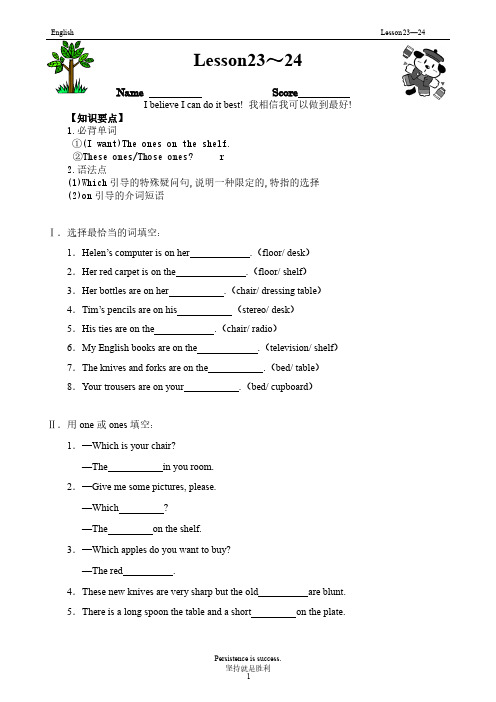
Lesson23~24Name ScoreI believe I can do it best! 我相信我可以做到最好!【知识要点】1.必背单词①(I want)The ones on the shelf.②These ones/Those ones? r2.语法点(1)Which引导的特殊疑问句,说明一种限定的,特指的选择(2)on引导的介词短语Ⅰ.选择最恰当的词填空:1.H elen’s computer is on her.(floor/ desk)2.Her red carpet is on the .(floor/ shelf)3.Her bottles are on her .(chair/ dressing table)4.Tim’s pencils are on his(stereo/ desk)5.His ties are on the .(chair/ radio)6.My English books are on the .(television/ shelf)7.The knives and forks are on the .(bed/ table)8.Your trousers are on your .(bed/ cupboard)Ⅱ.用one或ones填空:1.—Which is your chair?—The in you room.2.—Give me some pictures, please.—Which ?—The on the shelf.3.—Which apples do you want to buy?—The red .4.These new knives are very sharp but the old are blunt.5.There is a long spoon the table and a short on the plate.Ⅲ.按要求填词:1.I (宾格)2.She (宾格)3.We (宾格) 4.he (宾格)5.it (宾格)6.they (宾格)Ⅳ.根据情景用这两课的语言完成对话:1.A: Give , please.B: Which spoons? These?A: No, not those. The ones on the table.B: ?A: Yes, please.2.A: Give them some cigarettes, please.B: ? These?A: No, not those. The ones in the box.B: ?A: Yes, please.3.A: Give us our umbrellas, please.B: ? These?A: No, not those. Our umbrellas are on the chair.B: These?A: Yes, please.B: .A: Thanks.。
新概念一Lesson23-24
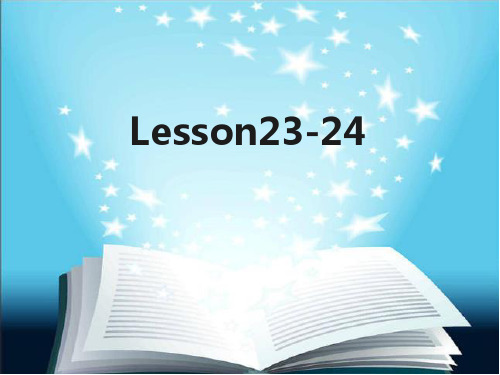
1.The book on the table is Lily’s. 定语 2.The picture on the wall is my brother's. 定语 3. The book is on the table. 表语
4. The boys are in the chair. 表语
5. The man is in the car.
介
第一人称 第二人称
第三人称
主格 I we you you he she it they
宾格 me us you you him her it them
副课练习A:用me,him,her,us或them填空。 1.Give Tim this shirt. Give _h_im__ this one, too. 2. Give the children these ice creams. Give t_h_e_m_ these, too. 3. That is my passport. Give _m_e_ my passport please. 4. Those are our umbrellas. Give _u_s_ our umbrellas please.
some + 可数名词复数 注:some也为名词前的
“限定词”
The ones on the shelf.
WOMAN: These?
MAN: Yes, please.
WOMAN: Here you are.
MAN: Thanks.
Lesson 23 Which glasses? MAN: Give me some glasses please, Jane. WOMAN: Which glasses? WOMAN: These glasses? MAN: No, not those.
新概念2Lesson23-24

Lesson 23 A new house【New words and expressions】★complete v. 完成(喜欢与建筑工程连用)① vt. 完成,结束complete the building② adj. 完整的,全部的《鲁迅全集》中的“全集” 就用“complete”This is a complete family.③ adj. 十足的,彻底的,绝对的There is complete silence in the room.近义词:finish v. 完成finish/complete homeworkfinish/complete doing sth. 某事做完了★modern adj. 新式的, 与以往不同的,现代的现代史/ 现代艺术modernization n.现代化★strange adj. 奇怪的(表示因为对一个东西不熟悉而觉得奇怪, 陌生的)① adj. 外地的,异乡的Living in a strange land is not always a pleasant thing.② adj. 陌生的,生疏的That morning, he saw a strange face in the classroom.Sth be strange to (sb)对……来说不习惯, 对……陌生这个城市对我来说很陌生be strange at sth. 对……是个外行n. 陌生人③ adj. 不平常的,奇特的,奇怪的,古怪的The house looks strange to some people.★district n. 地区,行政划分的区域, 城市内的district n. 地区,行政区,地域,地带,通常隶属于某个整体或具有某些地理特征 e.g. CBD= the central business districtE.g. The Lake District of Northern England is very beautiful. 英国北部的湖区非常美丽。
- 1、下载文档前请自行甄别文档内容的完整性,平台不提供额外的编辑、内容补充、找答案等附加服务。
- 2、"仅部分预览"的文档,不可在线预览部分如存在完整性等问题,可反馈申请退款(可完整预览的文档不适用该条件!)。
- 3、如文档侵犯您的权益,请联系客服反馈,我们会尽快为您处理(人工客服工作时间:9:00-18:30)。
新概念unit23-24(第一部分)人称代词宾格, one的用法
一,语法:
不定代词one 的用法:
one用来指同名的不同的物体.避免语言重复.它只能指代可数名词单数.复数要用ones.
相关句型:
A: Give me a cup , please.
B: Which one? The dirty one?
A: No, not this dirty one.
That clean one.
B: Here you are.
A: Thank you.
复数句型
A: Give me some cups , please.
B: Which ones? These ones?
A: No, those blue ones.
B: Here you are.
A: Thank you.
三,指示代词
This(这个), that(那个), these(这些),those(那些).
其实中this,that 表单数,these,those 表复数
this one 这一个 that one 那一个
these ones 这些 those ones 那些
新概念unit23-24(第二部分)生词,句型及课文知识点
1,生词请参照生词表
补充词汇:chopsticks 筷子,bowl碗
2,句型 :
Give me a bottle, please 请给我一个瓶子
Give me some bottles , please请给我一些瓶子
Which one?哪一个?
Which ones?哪些?
The red one?红色的那个吗?
Thee red ones?红色的那些吗?
新概念unit21-24(第三部分)作业(按顺序完成)
1,背: 1) 第23-24单元的生词表中的单词会背,下节课听写
2)背课堂笔记第二部分中句型,和人称代词表,主格,宾格,所有格,下节课听写.
2,听读:跟录音听读第23单元的对话每天两遍,会背。
3,做练习册的的习题.
人称代词和物主代词练习:(让孩子自己思考,如果有时间写的,可以交给我,我来批改,下节课OLI 抽其中的题目检查。
)
二,填空:
1, ________他们 went to the party last week。
The boys invited ________ 他们。
2._____我们love our country. _____她feeds _____我们with good food.
3,________我don’t like my shoes ._________我want to give __________它们to Mary because ___________她likes __________它们.
4,__________ (她们)have car, ________(它) is very beautiful, but _____________ (她们)lost ___________(它)last month.
5,_____我called _____你. Did you phone _____我? 6, Tell ____他们how to get there.
7,Put_______它here.
8,_____她says______他is very clever.
9.Who’s is there? It’s __________我.
10.What time is ________? _________’s 12 o’clock.
11,How far is ______to the zoo?
12,_________is so cold today.
13,_________is so cold today.
14.___________is Friday today.
15 “ du.du.du” “Who is ________?” “It is __________我”
16, Tell ________我们how far is ___________from Shanghai to Nanking.
17,_________’s cold . _________我think __________’s going to rain.
18, Show_________我your hands
19, Show ____________我how to do_________.
21________(我) am a teacher.
22.My father is talking with _______(我).
23._______(他) often plays basketball after school.
25._______(我们) buy a pair of shoes for _______(他).
26.Please pass_____(我们) the ball.
27._______(他们) are listening to the radio.
28._______(他) often plays basketball after school.
29.I will give the presents to________(他们).
30.Can you show _______(我) your book?
31.It’s time for ______(他们) to go home.
32.Mr. Green often tells _______(我们) some stories.
33.I saw ________(她) in the shop yesterday.
34._____ is my friend. 他是我的朋友。
35.My dog likes _____. 我的狗喜欢她。
36.Who is there? It’s _____. 是谁啊?是我。
e with _____. 跟我来。
38.______ are Chinese. 我们是中国人。
39.I want to buy some balloons for ______. 我想买些气球送给他。
40.These are ______ photos. 这些是我们的照片。
41._____ like ______ very much. 他们非常喜欢它。
42.Let _____ give _____ a book. 让我给你一本书。
43.This is _____ father. 这是我的爸爸。
44._____ like their car. 我喜欢他们的小汽车。
2,用one,ones 填空:
Do you have a cat ?
No, I don't have one. But my grandmother has _______.
I don't like coloured envelopes; I like white ______.
Do you have a camera?
No, but Tom has ____.
He bought ___ a week ago.
3,祈使句练习:
下列句子是祈使句的.把它的题号圈起来,并变成否定句(前加 don’t),
1)What’s your name?
2)This is a cat.
3)Look at me!
4)Open your eyes!
5)Come here!
6)Be quiet!
7)Are you thirsty?。
